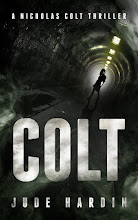My MacGuffin
The book I’m planning to go back out on submission with in January contains what movie folks commonly refer to as a MacGuffin; that is, an object that motivates the characters and advances the plot, but is fairly meaningless otherwise.
Alfred Hitchcock is sometimes credited with coining the term. Someone once asked him about it in an interview, and he said (paraphrasing): It might have come from a conversation on a train. Traveler A asks Traveler B what he has in the baggage compartment.
“A MacGuffin,” says B.
“What’s a Macguffin?”
“It’s a contraption for trapping lions in the Scottish highlands.”
“But there are no lions in the Scottish highlands.”
“Then that, my good man, is no MacGuffin!”
So you see, said Hitchcock, a MacGuffin is really nothing at all...
In Pulp Fiction, it was the briefcase.
In my book, it’s a camcorder tape.
While readers might be curious about the history behind it, and how a certain character got her hands on it or whatever, the MacGuffin, by nature, is really of no consequence. It just...is. It’s a plot device, pure and simple.
In my case, I allow the reader to see what's on the tape, but everything else about it remains a mystery.
There would be no plot without it, yet it is of no importance.
Make sense?
Good.
Has anyone else ever used a MacGuffin? Planning to, maybe?
I’d love to hear about it.
Alfred Hitchcock is sometimes credited with coining the term. Someone once asked him about it in an interview, and he said (paraphrasing): It might have come from a conversation on a train. Traveler A asks Traveler B what he has in the baggage compartment.
“A MacGuffin,” says B.
“What’s a Macguffin?”
“It’s a contraption for trapping lions in the Scottish highlands.”
“But there are no lions in the Scottish highlands.”
“Then that, my good man, is no MacGuffin!”
So you see, said Hitchcock, a MacGuffin is really nothing at all...
In Pulp Fiction, it was the briefcase.
In my book, it’s a camcorder tape.
While readers might be curious about the history behind it, and how a certain character got her hands on it or whatever, the MacGuffin, by nature, is really of no consequence. It just...is. It’s a plot device, pure and simple.
In my case, I allow the reader to see what's on the tape, but everything else about it remains a mystery.
There would be no plot without it, yet it is of no importance.
Make sense?
Good.
Has anyone else ever used a MacGuffin? Planning to, maybe?
I’d love to hear about it.


5 Comments:
Jude,
Funny you should mention Pulp Fiction; it was on last night.
I sometimes think my entire WIP is a MacGuffin; "of no consequence"....
Hey - And I just noticed I'm on your "suspect list". Thanks!
Possibly my first step to stardom....
Hmmm . . . I have a feeling that in a book it's a lot less fun/effective. Film, by its nature, is visual and we have glossier expectations depending on genre. Look at Ronin and the briefcase. There's a winking element, almost. It's slickly produced. I tend to not want a slick book. I want a good book, a deep book--still an entertaining book. I think if I READ a NOVEL of Pulp Fiction, I would think it a steaming pile of crap, versus a script--focus on dialogue, lack of depth, humor and pathos and music and character acting all rolled into one.
In a book, I would feel betrayed. Of course it's all in the exectuion, but depending on how big a plot point it is, if I got to page 300 and the author never clued me in, I don't think I'd be happy.
Just me, I guess.
E
One of my all-time favorite films, Dave.
Erica:
That's a good point. What works in film doesn't necessarily work in print. I'll call what I have a semi-MacGuffin, and leave it at that. It's not a huge plot point, and the reader gets to see at least part of its significance. Not quite the same as the briefcase in Pulp Fiction (although, come to think of it, Pulp Fiction is titled Pulp Fiction for a reason. The stories of Jules, Vincent, and Butch were inspired by the crime novels of a certain era).
Post a Comment
Subscribe to Post Comments [Atom]
<< Home